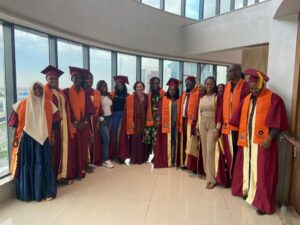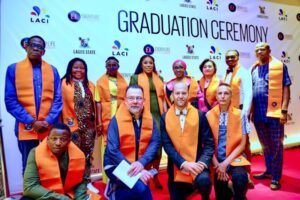Hajarat Abiodun Alli was among the 120 students who completed their twelve weeks courses and graduated from the EbonyLife Creative Academy (ELCA) on Friday, June 11, 2021.
Alli, one of the editors of Muslim News, didn’t only win multiple awards at the well-attended event, her story, ‘Monitoring Spirits’, was among the six short films produced by the graduating students and exhibited at the ceremony.
In this interview with MN Islamtaiment, Alli, a member of Vanguards Academy Old Students’ Association (VAOSA) related her experience being the only Hijabi, why she took the course, the inspiration behind the short film, and the need for Muslims to tell their stories, among others…
MN: You recently completed a course at Ebonylife Creative Academy, can you tell us more about it?
Alli: The Ebonylife Creative Academy is created to provide free and intensive training in film-making to any interested Nigerian youth. It’s the initiative of Mo Abudu and is sponsored by the Lagos State Government. I applied to take a course in screenwriting and got in after going through the acceptance process. It lasted for 12 weeks. We had our graduation on Friday, June 11. I’m really excited to be among the first intake Alumni.
MN: Why did you decide to take the course in screenwriting despite being a graduate with BSc, MSc?
Alli: Like you rightly said, I had my B.A. in English Language Education at the University of Ilorin, after which I proceeded to UI for my Masters where I had an M.A. in Communication and Language Arts with specialisation in Book Publishing and Development. Throughout my educational career, I’ve always followed a path that prepares me for what I love to do; storytelling. Taking the Art of Screenwriting course at the Academy is just another step in my education towards making me a better and impactful storyteller.

MN: How was your experience being the only hijabi in your class during the training?
Alli: Being the only hijabi in my class was neither special nor ordinary. Each person’s thoughts and life’s fragments are reflected in the stories they wrote. Through mine, I was able to make known a side of myself and my religion that is not known to them as I learned from their experiences too.
MN: You wrote the short film, Monitoring Spirits produced by the Academy? What informed the story?
Alli: The scripts for production were selected by the faculty, mine, and 5 others’. The story was informed by the disconnection between the older and younger generations. As part of the course, we carried out exercises that stimulated our thoughts and inspired our stories.
MN: Apart from writing the story, were you involved in the production, especially seeing the final project before it was released?
Alli: Coming up with a script was not easy but it was my job. So, I left the producers’ job to them. I visited the set once and that was it.

MN: How would you rate the performance of the characters?
Alli: They did try their best. The people who worked on producing the film were students like me and looking at the fact that we won the most awards at the graduation ceremony, we did very well.
MN: Some might say the casting of evil spirit scene is a bit derogatory and portray Islam in bad light. For instance, Muslims don’t usually flog victims possessed by jinns, this is one of the practices of the Christians, what is your take on this?
Alli: One of the processes of writing is research and another is experience. These two processes among others went into the film. My goal is not to portray Islam in a bad light, it is to show reality. And the reality is that many people claim to practice Islam but are doing it the wrong way as is seen in the film. Besides, the main character is not the only Muslim in the story, and the majority of those who believed she was possessed were not Muslims.
MN: Can you act? Are you considering taking a career in acting?
Alli: I’ve not given acting any thought. I do like to bring a story to life though, either through books or films and we’ll be making more of that in shaa Allah.

MN: What is your future plan? Is this filmmaking going to be a part-time or are you considering taking it as full time?
Alli: Books, documentaries, and films coming up. There’s a lot to do. More importantly, there’s more learning to do. Muslims have to tell their own stories if they wish to correct wrong perceptions. That can be achieves through effective story telling with high quality films for a general audience and not Muslims alone.



